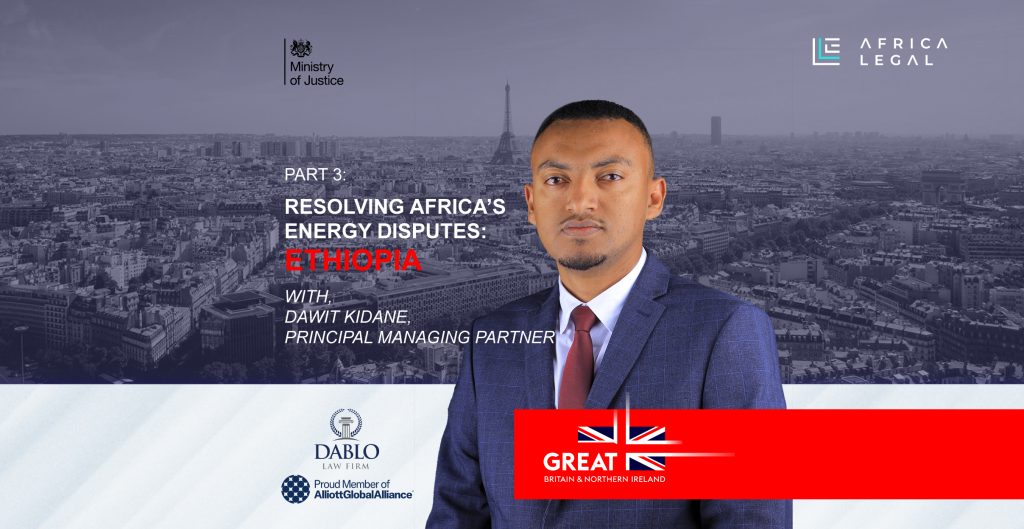Ethiopia’s vast untapped natural resource potential presents a significant opportunity for the country to develop its energy sector, enhance energy access, and promote sustainable development. Dawit Kidane shared his insight on disputes in this sector at the Africa Energy Dispute Resolution Roundtable.

The recent Africa Energy Dispute Resolution Roundtable, hosted by the UK Ministry of Justice GREAT Legal Services and Africa Legal, brought together key legal experts to discuss the future of energy disputes in Africa. In this, the third of four articles focusing on discussions at the event, we take a closer look at Ethiopia’s energy dispute landscape.
Dawit Kidane, Principal Managing Partner at DABLO Law Firm LLP, highlighted both the unique challenges and emerging opportunities in Ethiopia in light of increasing international investments and commitments to sustainable energy development.
“Ethiopia currently only has around 5 000 MW of electricity installed from hydroelectric, thermal, wind, biomass, solar, and geothermal sources while it is capable of generating over 60 000 MW,” Dawit said. “Ethiopia is actively looking for the right investors to utilise its abundant natural gas, lithium and other energy resources, which can play a crucial role in the global energy landscape. Ethiopia’s desires to accede to the WTO and implement the AfCFTA (African Continental Free Trade Area Agreement) are also opportunities for the energy sector. However, the sector also faces some challenges in relation to finding the right investors, security, political violence and conflicts, foreign exchange shortages and restrictions, lack of legal expertise, and lack of developed infrastructure and connectivity.”
Looking at the role legal practitioners play in influencing and advising the government and regulators, at the event Dawit emphasised the need for practitioners to build capacity and specialise in the energy sector within the African context. He also highlighted the importance of engaging in policy advocacy and suggested that lawyers advocate for alternative dispute resolution mechanisms specific to the energy sector and promote investor-oriented bilateral investment treaties.
With the global shift towards sustainable energy sources, Dawit says clear and consistent regulatory frameworks must be developed that provide investors with predictability and transparency. “Ethiopian legal professionals can also engage with foreign investors to understand their concerns, especially in public–private partnership (PPP) projects which were recently recognised as important vehicles by the Ethiopian government, and tailor legal solutions accordingly. By striking this balance, Ethiopia can attract and maintain foreign investment while ensuring a smooth and sustainable energy transition,” he explained.
The roundtable discussion focused on maximising the impact of local and international counsel working in collaboration. Dawit sees enormous value in collaborating with international colleagues in the energy disputes sector and in participating in events like the roundtable. “Ethiopian lawyers can play a crucial role in international collaboration for energy disputes by developing expertise in international energy law, fostering relationships with international legal professionals, and promoting Ethiopia as a hub for energy dispute resolution,” he said.
Looking ahead, Dawit anticipates numerous changes in the field of energy disputes and resolution in Ethiopia.
“Ethiopia ratifying the New York Convention to recognise and enforce foreign arbitral awards and the new Arbitration Conciliation Working Procedure Proclamation, can be taken as a step in the right direction to promote alternative dispute resolution mechanisms in the energy sector,” he said.
“Overall, the challenges faced in energy-related disputes are, among other things, the lack of specialised dispute settlement bodies, and a lack of expertise as a whole.”
Dawit pointed out that Ethiopia’s legal community “needs to build its capacity through networking, experience sharing and researching, and prepare itself to diligently provide its legal support as an advocator, a lawyer, an arbitrator, a judge, a lawmaker (drafter), or a policymaker.”
His focus on capacity building, policy advocacy and international collaboration aligns with the overarching themes of the roundtable, underscoring the importance of events like these and the need for diverse legal expertise in navigating the complexities of energy disputes in an era of rapid transformation.
Our copyright rules are as follows: “Re-publication of this article is authorised only in the following circumstances; the writer and Africa Legal are both recognised as the author and the website address www.africa-legal.com and original article link are back linked. A bio for the writer can be provided on request”






